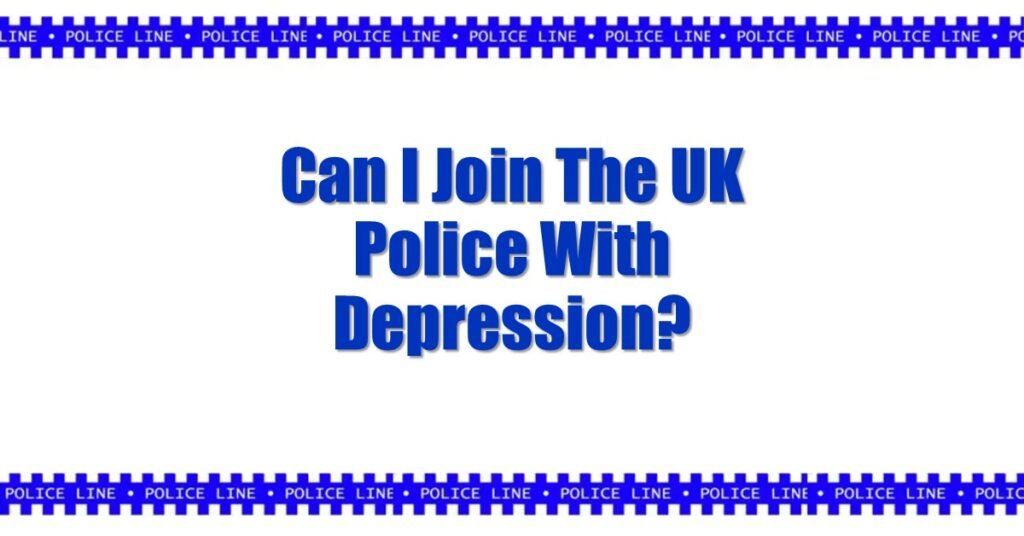Have you ever wondered if it’s possible to join the UK police force despite struggling with depression? You’re not alone. Many people who experience mental health challenges wonder whether they can pursue careers in law enforcement, and for good reason. Mental health conditions are often stigmatised and misunderstood, leaving individuals feeling unsure about their prospects of joining certain professions. Fortunately, the answer is not a straightforward one.
- Understanding The UK Police Force's Mental Health Standards
- The Impact Of Depression On Eligibility For The Police Force
- Seeking Professional Help For Mental Health Concerns
- Disclosing Mental Health History During The Application Process
- Is The Role Right For You?
- Addressing Stigma And Misconceptions Surrounding Mental Health
- Tips For Navigating Potential Barriers
- Moving Forward: Pursuing Your Career Goals.
- Final Thoughts: Can I Join The UK Police With Depression?
While having a history of depression may impact your eligibility to become a police officer or staff member, it doesn’t automatically disqualify you from consideration.
In this article, we’ll explore what qualifications and standards are required by the UK police force when it comes to mental health, as well as some tips on how to navigate any potential barriers you might encounter along the way.

So if you’ve been contemplating whether or not you can join the UK police with depression – keep reading!
Understanding The UK Police Force’s Mental Health Standards
Challenges faced by police officers include high levels of stress, exposure to traumatic events, and long work hours. Despite these challenges, there is support available for those who may struggle with their mental health while working as a police officer.

The UK Police Force has implemented various programs and resources to help officers maintain good mental health such as access to counseling services, peer support groups, and regular check-ins with supervisors.
It is crucial to prioritise one’s own well-being when considering joining the police force and seeking out support if needed can ensure a successful career in law enforcement.
The Impact Of Depression On Eligibility For The Police Force
Having depression does not automatically disqualify one from being a police officer. The impact of depression on eligibility for the police force varies depending on the severity and duration of symptoms.
Discrimination concerns are valid as mental health conditions can still carry a stigma in some workplaces, including government agencies.
But it is important to note that the UK Police Force has made strides in addressing discrimination and promoting diversity and inclusivity among its ranks.
Accommodations needed for individuals with depression may include ongoing therapy or medication management and regular check-ins with a supervisor or mental health professional.
Additionally, reasonable adjustments can be made during recruitment assessments to ensure equal opportunities for all candidates.
It is possible to join the UK Police Force with depression.
Eligibility will depend on symptom severity and duration, this will be discussed with a medical professional as part of your recruitment process.
Reasonable accommodations can be provided during recruitment assessments to ensure fairness.
Moreover, having experienced a mental health condition such as depression may even provide valuable insight into dealing with certain situations while serving as an officer.
Overall, those interested in joining the UK Police Force should not let their past experiences with mental illness deter them from pursuing this career path.
Seeking Professional Help For Mental Health Concerns
Imagine that you’re going on a hike, and suddenly, you find yourself lost in the woods. You feel overwhelmed with anxiety, fear, and confusion.
In this situation, would it be helpful to keep pushing forward while ignoring your emotions? Or would it be wiser to stop for a moment, take deep breaths, and consider your options?
Similarly, if you’re dealing with depression symptoms while pursuing a career in the police, or any field of work, seeking professional help can make all the difference.
Managing depression symptoms is not easy, but finding effective treatment options can give you the tools to cope with stressors without compromising your mental health.
Consider reaching out to qualified therapists or psychiatrists who specialize in treating mood disorders. By prioritising your well-being and taking proactive steps toward recovery, you can increase your chances of thriving both personally and professionally.
Remember that having depression does not define who you are as an individual nor does it mean that you cannot achieve your goals.
With proper support and guidance from professionals experienced in treating depression symptoms effectively over time, there’s no reason why anyone should have to compromise their dreams because of this challenging condition.
So don’t hesitate – reach out today!
Disclosing Mental Health History During The Application Process
- Applicants should be aware of their rights when it comes to disclosing their mental health history during the application process; they should know what information is required, and whether they have access to mental health support.
- Employers have certain disclosure requirements for applicants with a mental health history, and it’s important for applicants to be aware of these so that they can make an informed decision about whether to disclose or not.
- It’s also important for applicants to know what rights they have if they do decide to disclose their mental health history, such as the right to access mental health services, and the right to have their information kept confidential.
Mental Health Support
If you do decide to disclose your mental health history during the police application process, it’s important to remember that there are resources available to help you cope with any ongoing struggles.
Support groups can be a great way to connect with others who may be going through similar experiences and provide a safe space for discussing difficult emotions.
Additionally, developing healthy coping strategies such as exercise, mindfulness techniques, or therapy can also make a significant difference in managing symptoms of depression or anxiety.
Remember, taking care of your mental health is just as important as physical health, and seeking out support should never be seen as a weakness.
Is The Role Right For You?
You know you better than anybody else. Only you will know what triggers your depression and how you deal with this.
It may be worth contacting the force you are considering applying to and arranging a ‘ride along’ day. On these days, you will be able to go and observe police officers in action.
This will also give you the opportunity to ask them questions about what they regularly deal with, and the pressures that this puts police officers under.
From here, you can decide whether or not you feel that you will be able to cope with the work you will be undertaking.
It may be worth discussing this with somebody who knows you, and your mental health, in order to get another opinion as to whether they think that joining the police is a good idea for you now, or whether you should wait.
Addressing Stigma And Misconceptions Surrounding Mental Health
Overcoming stigma surrounding mental health is crucial for the overall wellbeing of individuals and society.
It is important to acknowledge that suffering from a mental ill health does not diminish one’s ability to perform their job or contribute to society in any way.
Unfortunately, there are still misconceptions about mental health that prevent people from seeking help or even disclosing their condition at work.
Mental health in the workplace should be treated with the same importance as physical health.
Organizations need to create an environment where employees feel safe and supported when discussing their struggles with mental health.
This includes providing resources such as counseling services, educating staff on mental health issues, and promoting open communication without fear of judgment or discrimination.
By addressing these stigmas head-on, we can create a more accepting culture and improve the lives of those affected by mental illness.
Tips For Navigating Potential Barriers
Navigating potential barriers can be challenging, especially for those struggling with mental health issues such as depression. However, it is important to remember that having a mental illness does not automatically disqualify you from joining the UK police. It is crucial to have coping strategies in place and build resilience to ensure success in the application process.
One helpful coping strategy is seeking support from loved ones or professionals, such as therapists or counselors. They can provide guidance on managing symptoms and developing healthy habits.
Additionally, focusing on self-care activities like exercise, meditation, and journaling can help improve mood and reduce stress levels.
Building resilience involves identifying personal strengths and values and using them to overcome challenges. This may include setting realistic goals, practicing positive self-talk, and maintaining a growth mindset.
Moving Forward: Pursuing Your Career Goals.
Overcoming obstacles is a part of life, and it can be especially challenging when pursuing career goals. If you are someone who has been struggling with mental health issues like depression, it’s natural to wonder if this will impact your ability to join the UK police force.
The good news is that having a history of depression doesn’t necessarily disqualify you from becoming a police officer. However, it’s essential to disclose any past or current mental health conditions during the application process. This information will help ensure that appropriate mental health accommodations are in place should they be needed.
It’s important to remember that seeking help for mental health issues doesn’t make you weak; instead, it shows strength and courage to prioritize your well-being while still pursuing your career goals.
Final Thoughts: Can I Join The UK Police With Depression?
In conclusion, if you are struggling with depression and have aspirations to join the UK Police Force, it is important to understand your own mental health, and the demands that the role will place on you.
From here, you can decide whether you feel that you are in a position where you can undertake the role, without negatively impacting your mental health.
While a history of mental illness may impact your eligibility for certain roles within the force, seeking professional help and disclosing your mental health history during the application process can increase your chances of success.
Remember that addressing stigma and misconceptions surrounding mental health is crucial in any workplace, including policing.




